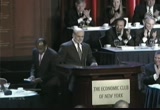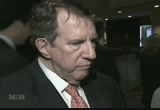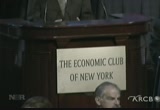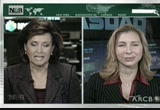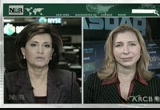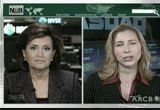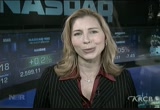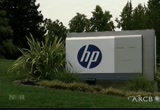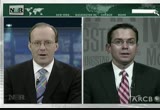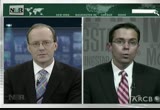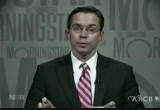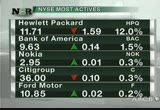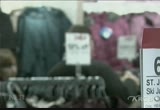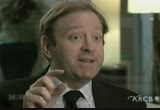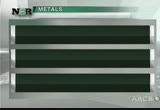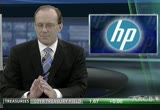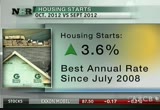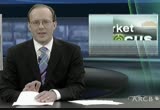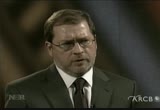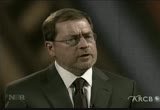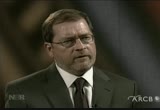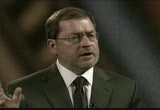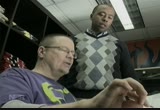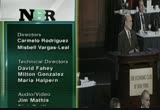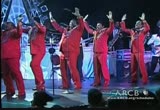tv Nightly Business Report PBS November 20, 2012 4:30pm-5:00pm PST
4:30 pm
>> this is nbr. captioning sponsored by wpbt >> susie: good evening. i'm susie gharib. federal reserve chairman ben bernanke warns congress to avoid the fiscal cliff, saying even the federal reserve doesn't have the tools to deal with the consequences. >> tom: i'm tom hudson. this man has many lawmakers pledging never to vote for higher taxes. find out what grover norquist thinks will happen with the fiscal cliff. >> susie: and hewlett packard
4:31 pm
stuns investors with news of an $9 billion mistake. >> tom: that and more tonight on nbr! >> susie: federal reserve chairman ben bernanke came to new york city today to send a tough message back to washington-- get your act together. he urged lawmakers and the white house to reach a quick deal to avoid the fiscal cliff, saying it might mean next year could be "a very good one for the economy." ben bernanke didn't endorse any specific tax or spending policies to solve the fiscal cliff, but he urged lawmakers to think creatively. he said an agreement on ways to reduce long-term federal budget deficits could remove road blocks to growth. on the other hand, going over the cliff might mean a recession. on top of that, worries about a deal were already causing trouble. > uncertainty about how the fiscal cliff, the raising of the debt limit, and the longer-term budget situation will be addressed appears already to be
4:32 pm
affecting private spending and investment decisions, and may be contributing to an increased sense of caution in financial markets. >> susie: wall street and business leaders were pleased that bernanke was talking tough. and they said the fed's role in the fiscal cliff negotiations is to communicate. >> tell the world and the individuals in the political establishment that they have to help get their act together or we have a problem, and that notion of preaching from the pulpit that he has is very fundamental. >> susie: is there another role or more of a role for the fed? >> i think to be a cheerleader and to be on the sidelines telling the government they have to do what is right for the public. >> susie: as for what the fed can do if the u.s. heads into recession because of the fiscal cliff, bernanke says, not much. >> in the worse case scenario, where the economy goes off the broad fiscal cliff, the largest fiscal cliff, which, according
4:33 pm
the c.b.o. and our analys, would send the u.s. economy into recession, i don't think the fed has the tools to offset that. >> susie: members of the audience agreed. >> he was very frank in saying, you know, "we can try," he essentially said, "we will try, but we don't have anything in our arsenal that comes close." >> susie: bernanke is already using the weapons in his arsenal to fix the job market, which he said today is still "unhealthy". he also repeated the fed's plan to keep interest rates super low at least into 2015. >> we will want to be sure that the recovery is established before we begin to normalize policy. we hope that such assurances will reduce uncertainty and increase confidence among households and businesses. >> susie: but bernanke gave no hints on when americans can expect to see higher rates. >> the further we go down the road, the question is going to turn to how is the fed going to reverse policy, and what the chairman said today is that
4:34 pm
decision is a long way off. >> susie: on wall street, stocks slipped on that fiscal cliff warng frobernanke and then recovered. the dow lost seven points, but the nasdaq and the s&p both gained about a point. rebecca patterson joins us now to talk more about the markets and bernanke. she's the chief investment officer of bessemer trust. >> hi, rebecca, nice to have you with us. >> hi. thank you. >> susie: so when i was at this event where ben bernanke was speaking, a number of the money managers i talked to said that the markets really haven't factored in the prospect of falling off of the cliff. how hard do you think the markets could fall if that were to happen? what are your thoughts on this? >> if we don't have a deal by year end and we do go off the cliff, even if it is just for a few weeks, i think the market implications are pretty severe. if you look at the implied volatility of the stock market right now, the vics
4:35 pm
index, it is suggesting everything is going to be fine, there is no near-term risk factored in, and that makes me very nervous. we are being very defensive, given that risk is still out there. i wouldn't be shocked to see 5%, 10%, if we went off the cliff on the s&p. that wouldn't be a big surprise to me. put it into perspective, last august when we had the debt ceiling and a downgrade, we saw a much bigger fall in the stock market then. >> susie: you say you're uncomfortable with this kind of uncertainty. how are you positioning the portfolios for your investors? you said you're defensive. tell us more. >> so into the u.s. election, especially given that the polls were leaning towards obama, we had taken a defensive stance already. we had gone slightly underweight equities, and added more things like high-yield mortgage debt, emerging market debt, and
4:36 pm
mortgage-backed securities, that will yield as much as capital appreciation, and investments that have lower volatility than the stock market. so we have an overweight there. those investments i just spoke about, that's about 24% of our portfolio right now, and that's definitely helped us get through the last few weeks without giving up much of our gains. >> susie: tell us a little bit about -- well, you are on the buying side with equities, what are you buying? are you in u.s. stocks? international stocks? what is the mix? >> sure. one of the interesting things i think over the last few months, and maybe this isn't putting it very elegantly, but i like to think about it as revenge of the global investor. for all of 2011, and the start of 2012, we saw the s&p as one of the world's leading stock markets. and a lot of investors said, why don't i just own u.s. stocks and why bother with this global investing stuff. but what we've seen since
4:37 pm
july, non-u.s. equities have been outperforming u.s. equities by quite a bit, especially recently. >> susie: when you say non-u.s., what are you talking about, emerging markets? europe? >> we're talking about a mix of both of those. we do have some european equities. normally there we're focusing on global companies that have to be dodomiciled in eure. and the u.k. and switzerland as well. companies that don't depend on the greek consumer for the demand, but are truly multi-national. we do own some european stocks and they have done very well recently and emerging markets. >> susie: that's a very interesting twist because most people don't think of europe for their poormts, portfolios, at least not now. thank you so much, rebecca. rebecca >> reporter: i'm suzanne pratt. still ahead, i'm working really hard today doing research for
4:38 pm
onef my favorites stories, black friday shopping. >> tom: hewlett-packard has been struggling to keep up with the quickly changing computer business. the market is shifting from desktop and laptop computers, where h-p reigns, to smart phones and tablets, where the firm barely has a presence. so it's no surprise business is weak. but what was a big surprise when h-p reported its quarterly results was a lot of red ink, blamed on what the company said was accounting fraud at a firm it bought a year ago. the allegations of deception are just the latest bad ws for the chnogy giant. it wrote down $8.8 billion related to its buyout of business software company autonomy. h-p paid $11 billion for the firm last year. h-p c.e.o. meg whitman said their own probe found serious accounting improprieties and outright misrepresentations. for instance, hewlett-package claims autonomy recorded revenue from deals even when a customer didn't buy anything.
4:39 pm
the buyout of autonomy happened before whitman took over h-p. the deal was part of a strategy to increase h-p's software and services business, which usually come with higher profit margins than h-p's traditional computer and printer business. the former c.e.o. at autonomy, mike lynch, tells "the wall street journal" claims of accounting fraud are "completely and utterly wrong." grady burkett is the director of technology research at morningstar. joins us from chicago. we'll talk about the business at h.p., bu at hand, what do the accounting claims say about h.p.'s own due diligence in the buy outa year ago. >> ith i think it is important to separate out the goodwill impairment. it is a non-cast charge. i think most investors were aware that h.p. overpaid for autonomy. so it doesn't affect our forecast for h.p. what it does highlight, though, is that there are
4:40 pm
potentially further corporate governance issues, and management control issues. but, more importantly, this is going to be -- this litigation will be an ongoing stracts for senior management, at a time when many of their existing businesses are facing competition. >> tom: it overpaid, having trouble integrating it, and the fiscal fourth quarter results, this is what they looked like. h.p. earned $1.16 a share, minus all of the charges, two cents better than expected. what kind of shape is h.p.'s business in? >> i think everybody recognizes and everybody rec nice to meet you, recognizes that there are secular pressures. h.p. can continue to drive profitability i those businesses, andwe see those as steady cash generators going forward. the bigger concerns with us for h.p. is in its enterprise hardware, enterprise services, and
4:41 pm
enterprise software. hardware did not perform very well, and services is an issue, and will be for at least 12 months. that's where h.p. needs to compete and be aggressive. >> tom: grady, not a great outlook. you went through a laundry list of ills at h.p. yo know the share price today down 12% almost, down at better than a decade low. is it worth buying here below $12? >> so the stock looks fundamentally undervalued to us on a modeling basis. however, we see a lot of uncertainty in this name, both near-term and long-term, so we really wouldn't get excited about h.p. as a stock. >> tom: okay. do you own any? >> i do not. >> tom: not excited and you don't own it. there you go. we'll leave it there. grady burkett with us, technology analyst a morningstar. >> susie: it's being called the
4:42 pm
biggest insider trading arrest-- a former hedge fund manager from s.a.c. capital was arrested today for using confidential information to trade ahead of public news on two pharmaceutical stocks. allegedly, mathew martoma got his information from the doctor running an alzheimer's drug trial. his firm made profits of $276 million. prosecutors say the fraud is the most lucrative insider trading scheme ever. martoma was charged in u.s. district court in manhattan and could face as much as 40 years in prison. >> susie: after eating all that food on thanksgiving, getting some exercise at the mall might
4:43 pm
be a good idea. and according to a new sury, 60% of consumers plan to shop over the thanksgiving weekend, many more than last year. but it turns out not everyone is headed to the mall. tonight, suzanne pratt continues our special weeklong look at holiday retailing. >> reporter: this is a typical scene on any black friday in previous years, and it's likely to occur again this week. increasingly, however, black friday shopping is also happening here. and with two venues, shoppers may wonder where they'll find this year's best deals. after all, isn't that what black friday is all about? surprisingly, there's no clear- cut answer, although one online store is dominating. >> the 100-pound gorilla out there is amazon-- toys, right? books. i mean, check in with amazon, because they always have the same item cheaper.
4:44 pm
>> reporter: and guess what. amazon.com black's friday store is already open for business. so are many web sites for other popur brick and mortar stores. but let's say you're a diehard target shopper. is the better deal offline or online? advertising executive andrew bennett says savvy retailers recognize there can be no distinction. >> what you're already seeing is this blurring between offline and online, and almost a coming together of black friday and cyber monday. >> reporter: and guess what. it turns out bombarding consumers with ads for black friday deals does result in big spending, both online and in stores. >> it works to drive traffic. we know that black friday tends to be number one or number two in terms of volume days through the year, so it does work. >> reporter: still, all that retail activity on black friday and thanksgiving weekend may
4:45 pm
actually stop consumers from shopping in the first half of december. that pause in spending might also happen because it turns out deals are even better closer to christmas. that means i might be waiting and doing a lot of my shopping right here at the office. suzanne pratt, nbr, new york. >> tom: stocks marked time after yesterday's big rally as trading volume slowed ahead of the thanksgiving holiday. the s&p 500 began with some
4:46 pm
early profit-taking, but rebounded mid-morning on a better than expected report on new home construction. a midday sell-off came when federal reserve chairman bernanke warned about the economic consequences if congress and the white house don't hammer out a deal to avoid the fiscal cliff. the index finished with a small gain. trading volume was lighter-- 641 million shares on the big board; under 1.6 billion on the nasdaq. the healthcare and financial sectors saw the best gains, up a half percent each. technology was the hardest hit, down six tenths of a percent. and that's because of the big drop in hewlett-packard. the stock was hit by its massive write-down, which we reported on earlier, and a disappointing outlook. shares fell 12%. volume was huge, more than six times normal. at $11.71 per share, this is h-p's lowest stock price since the mid-1990s. it has lost more than half its value we have a deeper dive into hewlett-packard's stock chart. it is on our web site, nbr.com. click on the "blogs" tab and look for michael kahn. h-p's outlook also hung over other companies that are big in the traditional computer market.
4:47 pm
semiconductor maker intel dropped 3.7% to a new 52-week low. intel has been criticized for being late to get more involved in the mobile computing market. disk drive maker western digital fell 2.6%. advanced micro devices, another semiconductor company hit by weak personal computer demand, fell 2.1%. home builders keep breaking ground on new houses with more evidence of confidence in the housing market. housing starts rose 3.6% in october to their best annual rate in more than four years. the data was much stronger than anticipated. homebuilder stocks found buyers. the biggest builder by market value, lennar, rallied 3.5%. it recently traded at a six week low. consumer electronics super store best buy isn't riding any wave of optimism with housing. it describes its latest quarterly financial performance as "clearly unsatisfactory". here's what it was referring to.
4:48 pm
after one-time charge the company earned just three cents per share, a fourth of what was expected and a huge drop from a year ago. best buy shares fell to a new decade low, dropping 13%. the store does not expect the rate of decline will continue this quarter. that was no solace for investors today. four of the five most actively traded exchange traded products were higher. the lone loser was the emerging markets fund, slipping two- tenths of a percent. and that's tonight's "market focus."
4:49 pm
>> susie: after the thanksgiving break, lawmakers will get back to work hammering out a deal to avert the fiscal cliff. grover norquist heads up americans for tax reform. he's is known in washington as a powerful force in the republican party and a strong voice against tax increases. darren gersh sat down with him today and began by asking whether republicans will accept higher tax rates to avoid the fiscal cliff. >> well, one thing to look at is what happened two years ago, when you had the exact same situation. two years ago, you had a republican congress coming in, the democratic senate and the democratic president. that's exactly what you have today. two years ago, obama looked at the economy and said the economy is so bad, we should extend all of the tax rates and have not a tax increase. the economy is not any better than two years ago. one of the resting places might be to extend it out six months, a year, two years, four years, and focus on other things
4:50 pm
because there is not an agreement here. >> but republicans and speakers have already put tax revenue on the table. does that make the pledge not to raise taxes now meaningless? >> what he said was that he supports the idea of revenue have economic growth and tax reform as part of getting revenue for the government. we need to do that. revenue today is at an all-time low because the economy is so bad. we have 10 million fewer people working than if we have a reagan-style recovery. obama's recovery has 10 million unemployed people. more jobs, more people working, more revenue. that is what boehner said a year ago, that he wanted to do in some sort of grand bargain, and that's what he said again. >> but when the speaker came out of the meeting at the white house, he said he was open t doing the tough things, putting more tax revenues on the table, closing more tax loopholes. aren't we arguing over semantics? >> i have not heard a
4:51 pm
shift from revenues from growth and tax reform. however, that said, the republicans, looking at an agreement, are waiting for president obama to put anything on the table. >> but if the republican leadership does some kind of deal with the president, where they raise tax rates, but in return they get deep entitlement savings, they do something like a 2 trillion-dollar grand bargain, that cuts the deficit over the next 10 years, are you still going to go aft republicans who vote for that? >> you have so many hypotheticals there. we have had this conversation for the past two years, and the democrats refused to be any part of reducing. or spending entitlementments. the president talks about his spending plans. he is planning on raising so much in taxes that he can spend more. so he isn't even on the planet of reducing the cost of gernment. >> there is an increasing number of conservatives who are saying that the
4:52 pm
republican brand is in danger of being seen as only in favor of keeping tax cuts for the wealthy, it is in danger of becoming an elitest party, and it meeds to d -- needs to do more to the working class and working class group. what do you think of that? >> you always have people after a difficult election turn left. but they make no sense. take a look at what is really happening. the president of the united states has said, let's tax the rich people. in his budget he raises taxes on higher incomes and half of all small businesses. that's a body blow to the maul businesses. small businesses. they want to tax the higher income people first and then they're going after everybody else. the good news is when you do apolog polling on this, as yu did last year, obama says
4:53 pm
we're going to rich? anhey said, do you think he will also tax the middle class and 75% said yes. the code is tax the rich people first and then you. >> grover no norquist, president for tax reform, thank you. >> good to be with you. >> tom: tomorrow on nbr, we talk health care reform with florida's largest health insurer. the chairman and c.e.o. of florida blue, patrick geraghty, joins us. and how's business at 35,000 feet? an update on the nation's airlines as the busy holiday travel season heats up. >> susie: we know these are tough times for businesses to get loans. it's even harder for non- profits. last night, we told you how individual investors are helping to finance local organizations with community investment notes. tonight, diane eastabrook shows us how this investment is creating jobs in one of chicago's poorest neighborhoods. >> reporter: this looks like an ordinary store on the outside,
4:54 pm
but inside, it's something else. the nonprofit stewards market is three businesses in one. there's king lizzy, a boutique specializing in urban t-shirts, hats, and custom-painted sneakers; a recording studio for budding hip-hop artists; and a business that washes and refills soap and shampoo bottles for hotels. all three provide jobs for at- risk teens and young adults like shevelle walton. >> i was looking for a job probably for, like, i'd say about a year straight. >> reporter: former futures trader rowan richards started the stewards market six years ago. >> what's the background on that shoe going to be? >> reporter: even though sales topped $50,000 last year, richards says he recently had trouble getting a loan to expand. >> we didn't have enough track record a lot of times, you know, and people didn't understand who we were. "okay, nonprofit-- that's also doing business. we want to see a little bit, come back and talk to us later." >> reporter: the stewards market eventually got a $50,000 loan thanks to calvert foundation's community investment notes. the notes work like bonds, and
4:55 pm
let individual investors finance a variety of community programs from affordable housing to job training. stewards market provides opportunity in an area where very little opportunity exists. unemployment in the humbolt park neighborhoods abou14%, and many families in this neighborhood have been struggling with poverty for generations. calvin holmes heads the chicago community loan fund, which distributes financing from calvert to local organizations. holmes says the groups don't need to have spotless credit histories, but they do need solid business plans. >> we have a compliance monitoring team that meets with our customers on a regular basis, and we're always trying to help them not only get to the finish line, but to be successful as an organization in the long haul, because the goods that they provide and the services they provide are so important to us. >> reporter: the stewards market used its loan to buy new computers. it also hopes to buy a machine that will paint sneakers, instead of requiring an artist to do the job by hand. so far, sales this year are more than double last year, putting the stewards market on track to
4:56 pm
repay its loan and make money for investors. diane eastabrook, nbr, chicago. >> susie: that's "nightly business report" for tuesday, november 20. have a great evening, everyone, and you too, tom. >> tom: good night, susie. we'll see you online at nbr.com, and back here tomorrow night. captioning sponsored by wpbt captioned by media access group at wgbh access.wgbh.org >> join us anytime at nbr.com. there, you'll find full episodeof t program, complete show transcripts and all the market stats.
181 Views
IN COLLECTIONS
KRCB (PBS) Television Archive
Television Archive  Television Archive News Search Service
Television Archive News Search Service 
Uploaded by TV Archive on

 Live Music Archive
Live Music Archive Librivox Free Audio
Librivox Free Audio Metropolitan Museum
Metropolitan Museum Cleveland Museum of Art
Cleveland Museum of Art Internet Arcade
Internet Arcade Console Living Room
Console Living Room Books to Borrow
Books to Borrow Open Library
Open Library TV News
TV News Understanding 9/11
Understanding 9/11
